Robert Schneider, M.D., F.A.C.C., is no stranger to the field of integrative medicine and its effectiveness in improving individual and public health. As Dean of the College of Integrative Medicine at Maharishi International University, he has directed or co-directed more than $25 million in grant-funded research on mind-body medicine from federal institutions such as the National Institutes of Health and the U.S. Department of Defense. Dr. Schneider has published over 175 peer-reviewed articles addressing the findings of this research and is the author of Total Heart Health.
But the COVID-19 pandemic added an entirely new dimension to Dr. Schneider’s concerns about the existing medical paradigm. The tragic global trajectory of the disease and the resulting loss of life, along with an epidemic of associated mental-health issues, has given new urgency to the need for effective alternative approaches to health care. The restrictions on human connection during the pandemic have fueled high rates of isolation, anxiety, depression, insomnia, and stress, leading to a 10 to 60 percent increase in needless deaths1—an epidemic that JAMA Psychiatry calls “the age of depression.”2
The COVID-19 pandemic… has given new urgency to the need for effective alternative approaches to health care.
A Gathering of Voices—“Beyond Immunity: Transforming Health”
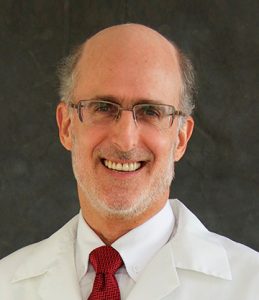
Robert Schneider, M.D., F.A.C.C.
To address these urgent needs, Dr. Schneider gathered medical professionals from mind-body medicine and integrative health to join hands and work together to create a new model of health. Last summer, he contacted his physician colleagues across the globe and convened an online conference, hosted by Maharishi International University (MIU), titled “Beyond Immunity: Transforming Health,” July 9, 2020. (Videos for each part of the conference may be found below.)
The conference brought together world leaders from different branches of integrative medicine to discuss how best to deal with the pandemic and to structure “higher-order medical modalities” for the future—in other words, more effective and expanded approaches and treatment options to address the needs of all patients.
The speakers addressed holistic health from different angles, but they all emphasized the need to incorporate multiple approaches to health care and move beyond the existing medical paradigm. In this sense, the conference was a rare gathering of progressive medical professionals, united by a common purpose. It was also reminiscent of the many symposia that MIU Founder Maharishi Mahesh Yogi often convened to explore and improve different fields of knowledge collectively.
To address these urgent needs, Dr. Schneider gathered medical professionals from existing mind-body approaches to join hands and work together to create a new model of health.
The Connectome, from the Universe to the Unified Field
Central to the conference presentations was what Dr. Schneider calls the connectome. The connectome expands the idea of the genome (all genes in one’s DNA) and the microbiome (all microorganisms in one’s gut) to include the fundamental interconnectedness of all dimensions of human life, from the macroscopic to the microscopic.
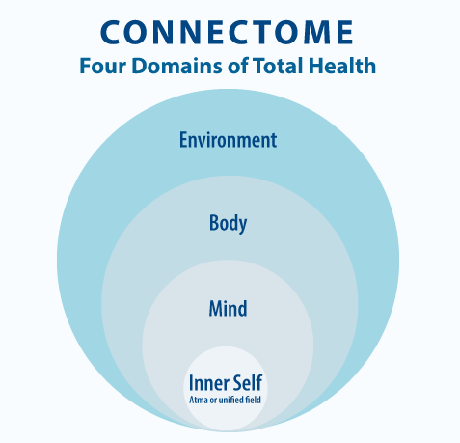
The connectome encompasses four domains of health
The connectome ranges from universal to environmental, societal, and individual health, which in turn includes organ and cellular health, the fundamental fields of biochemistry and physics, mental and emotional health, and ultimately consciousness itself—our own core reality or innermost Self.
Ancient Ayurvedic texts and advances in modern medical research demonstrate that the interplay of these interdimensional networks directly affects the strength of our immune system and the vitality and resilience of our minds and bodies in the face of environmental stress. Effective integrative health care, therefore, needs to address all dimensions of human life and their connections—and to offer tools to prevent or eliminate imbalances on any level.
All the conference speakers agreed on these fundamentals as they addressed different aspects of the connectome. In addition, they collectively emphasized the importance of multimodal treatment options to move beyond the current medical paradigm and address every dimension of human health.
Watch Dr. Schneider’s Keynote Address on the Connectome (conference part 2, 19:41)
Effective integrative health care, therefore, needs to address all dimensions of human life and their connections—and to offer tools to prevent or eliminate imbalances on any level.
Moving beyond the Current Paradigm to Total Health
The co-moderators of the conference opened the discussion by introducing the main themes of the presentations.
Suzanne Steinbaum, D.O., a cardiologist and spokesperson for the American Health Association, commented, “In this time of world stress, the medical paradigm of diagnosis and treatment is no longer valid. The focus needs to be more on how we can achieve our own maximum health. We need to move to integrative healing and focus on ourselves in a different way to reach ultimate transformation.”
Remy Coeytaux, M.D., Ph.D., director of the Wake Forest School of Medicine Center for Integrative Medicine, added, “In this conference, thought leaders in integrative medicine, functional medicine, and traditional medical systems, such as Ayurveda and Yoga, will share their insights about health in general and immunity in particular. No one paradigm can fully capture the wonders of nature, so we’ll share knowledge and multiple perspectives to develop new insights and understanding of health and immunity.”
Tony Nader, M.D., Ph.D., M.A.R.R., world-renowned neuroscientist, bestselling author, educator, and director of the international Transcendental Meditation organizations, opened the discussion by emphasizing that the true basis for ideal health is the primordial reality of our own consciousness.
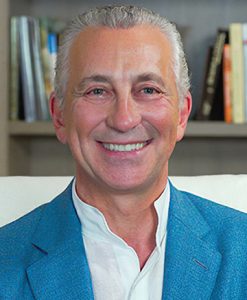
Tony Nader, M.D., Ph.D., M.A.R.R.
Integrative medicine should include all aspects of health—proper exercise, an organic diet, a balanced daily routine, and avoidance of toxins—in order to prepare the physiology to deal with stress, disease, and environmental upheaval, Dr. Nader explained. But on a more fundamental level, by directly developing consciousness, the TM technique enhances and transforms the functioning of the brain and nervous system, enabling the individual to make better decisions from a healthier and more settled level of physiological functioning.
Dr. Nader emphasized that the future of health care should be based on prevention through the development of consciousness, which in turn will promote broader comprehension and more effective leadership.
Dr. Nader’s new book, One Unbounded Ocean of Consciousness: Simple Answers to the Big Questions in Life, addresses life’s most challenging questions from this perspective of fully developed consciousness and balanced physiological functioning.
Mimi Guarneri, M.D., F.A.C.C., global president of the Academy of Integrated Health and Medicine, spoke about changing lives through science and compassion. In the context of integrative medicine, she emphasized that human health cannot be separated from planetary and environmental health. She cited research showing that the damage wrought by climate change and environmental toxins—and the policies that contribute to them—directly contributes to high stress levels and immunological dysfunction, as does the social isolation caused by the pandemic. Consequently, the “ill to the pill” medical paradigm needs to be replaced by an ecological model of global health.
A transition to sustainable energy policies could reverse damaging environmental trends by supporting disease prevention and health creation. “The planet is also our patient,” she said, “and healing it is equally our responsibility.”
Watch Dr. Nader’s and Dr. Guarneri’s talks (conference part 1, 34:52)
Dr. Nader emphasized that the future of health care should be based on prevention through the development of consciousness, which in turn will promote broader comprehension and more effective leadership.
The Connectome and the Full Range of Human Health
These presentations introduced the range of human health and opened the door for Dr. Schneider’s keynote presentation. He emphasized the importance of reestablishing connection in order to transform immunity and health, and he introduced the concept of the connectome in the context of whole-system immunity for a post-COVID era.
He pointed out that 25 percent of the population currently suffers from depression, anxiety, and stress, and that research has confirmed the direct link between high stress and lower life expectancy.3,4 More specifically, perceived stress alters brain functioning and thereby leads to a weakened immune response and resulting cellular mortality—the mind-body connection writ large.5
This array of influences on human health represents the four fundamental domains of the connectome: environment, body, mind, and universal Self—the whole range of human experience.
Drawing from systems medicine, which looks at the relationships of networks within our bodies and the larger environment, Dr. Schneider traced the arc of human health from the universe to the unified field—a range encompassing the planet, environment, ecosystems, society, individuals, organs, cells, macromolecules, DNA, the laws of biochemistry, and the deeper laws of quantum physics and superstring theory.
This array of influences on human health represents the four fundamental domains of the connectome: environment, body, mind, and universal Self—the whole range of human experience.
Watch Dr. Schneider’s Keynote Address (conference part 2, 19:41)
Practical Applications: The TM Technique, Maharishi AyurVeda, and Multimodality Approaches
Dr. Schneider presented empirical evidence showing that the specific techniques and modalities of Maharishi AyurVeda® and Integrative Medicine, including Transcendental Meditation practice, can address these different layers of the connectome to restore balance and promote health.
Reduced PTSD Symptoms in U.S. War Veterans
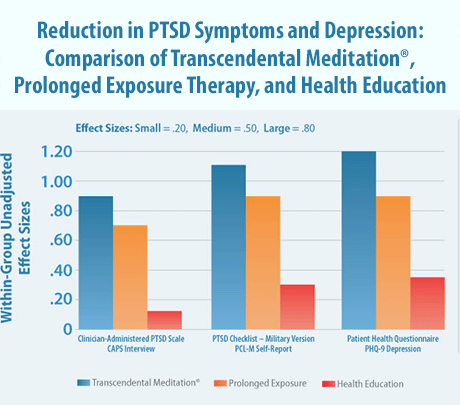
S. Nidich et al. “Non-Trauma Focused Meditation Compared to Exposure Therapy in Veterans with PTSD: A Randomized Controlled Trial.” The Lancet Psychiatry 5 (12) 2018: 975–986.
In June 2020, JAMA Psychiatry concluded that “psychosocial interventions are reliably associated with enhanced immune system function.”5
A recent multiyear study funded by the U.S. Department of Defense compared the effectiveness of TM practice, Prolonged Exposure Therapy (the psychiatric gold standard), and health education in reducing PTSD symptoms in U.S. war veterans. It found that TM practice was at least as effective as the gold standard therapy on PTSD and the most effective of the three in reducing depression (see chart).
These findings confirmed that reestablishing the connection with one’s own inner Self helps restore psychological balance, even in those affected by severe trauma.
Reestablishing the connection with one’s own inner Self helps restore psychological balance, even in those affected by severe trauma.
48 Percent Reduction in Death, Heart Attack, and Stroke
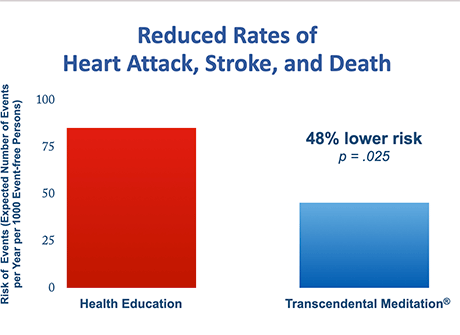
R. H. Schneider et al. “Stress Reduction in the Secondary Prevention of Cardiovascular Disease: Randomized Controlled Trial of Transcendental Meditation and Health Education in Blacks.” Circulation: Cardiovascular Quality and Outcomes 5 (6) 2012: 750–758.
A randomized controlled trial comparing the TM technique and health education in the prevention of heart disease in Blacks found a 48 percent reduction in death, heart attack, and stroke in the TM group (see chart). This study confirmed the profound significance of stress reduction in promoting health and longevity.
Patients who have already had a heart attack are at very high risk for having a second one, and any heart attack can be deadly. Those who practiced the TM technique for 5.4 years nearly cut in half their risk of death, heart attack, and stroke, as documented in this 10-year randomized, controlled clinical trial funded by the National Institutes of Health. The results were so significant that the American Heart Association’s journal Circulation: Cardiovascular Quality and Outcomes published the study in 2012, and hundreds of articles appeared in newspapers worldwide to share these dramatic findings.
Those who practiced the TM technique for 5.4 years nearly cut in half their risk of death, heart attack, and stroke.
Reduced Hospital Admissions across All Disease Categories
A study of 700 subjects participating in a multimodality Maharishi AyurVeda and Transcendental Meditation intervention as part of a Blue Cross–Blue Shield study, with several thousand controls, found reduced hospital admissions in all disease categories (see chart).
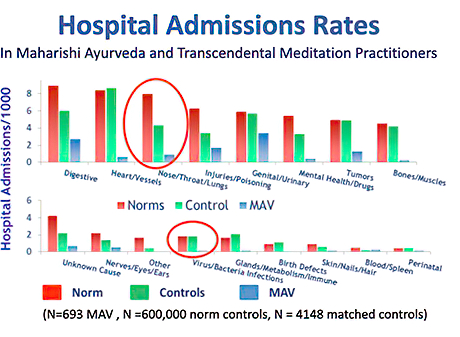
D. W. Orme-Johnson and R. E. Herron. “An Innovative Approach to Reducing Medical Care Utilization and Expenditures.” The American Journal of Managed Care 3 (1) 1997: 135–144.
The Maharishi AyurVeda modalities included TM practice, a plant-based diet according to body type, herbal supplements, Maharishi YogaSM asanas, and a balanced daily routine, including early bedtime. Of particular importance, respiratory disease for the Maharishi AyurVeda and TM group dropped by 80 percent and infectious diseases by 90 percent.
This research on the TM technique and Maharishi AyurVeda confirms the profound impact of these approaches in reducing stress, improving mental and physical health, and strengthening the immune system—crucially important outcomes for public health.
“Connection is the key theme,” Dr. Schneider said. “If we can restore balance on each of these levels and their interconnectedness—ultimately to our innermost Self—then we’ve got total health. The techniques and modalities of Maharishi AyurVeda and Integrative Medicine address each level of the connectome—the interdisciplinary, interdimensional connectedness between all the systems and networks that comprise our health as individuals and as a society.”
Respiratory disease for the Maharishi AyurVeda and TM group dropped by 80 percent and infectious diseases by 90 percent.
“Health Artisanry”
Following Dr. Schneider’s presentation, Robert Luby, M.D., director of the medical education initiative at the Institute for Functional Medicine, elaborated on these key concepts in the context of creating “citizen artisans” of health.
Functional medicine focuses on physiological function and the environmental factors that most affect it in any given patient. It helps identify the unique antecedents, triggers, mediators, and mental, emotional, and spiritual factors that have made the most significant contribution to disease in any individual’s life circumstances. By identifying these physiological functions and environmental contributors, this approach educates patients to modulate their environments and lifestyle choices—their sleep, diet, breathing, movement, and so forth—to improve their overall function and health. In this way, individuals take responsibility for their own well-being.
“If we are to transform medicine, it’s going to take citizen artisans of health,” Dr. Luby said. “The physician starts the process, but then patients take agency for their own health and embrace health as a skill set. And on a scalable societal level, we need to connect, communicate, and coordinate our efforts, coming together as organizations to bring health to the entire population.”
Watch the talks by Dr. Luby, Ms. Wegman, and others (conference part 3, 41:06)
“If we are to transform medicine, it’s going to take citizen artisans of health. The physician starts the process, but then patients take agency for their own health and embrace health as a skill set.” —Dr. Robert Luby
Maharishi AyurVeda Modalities, from Yoga to Pulse Diagnosis
Sankari Wegman, M.S., is an MIU doctoral candidate and instructor who has extensive teaching experience and clinical practice with Maharishi AyurVeda modalities. She further elaborated on Dr. Schneider’s presentation about the connectome and supported the multimodality approach to health from her clinical experience. In addition to her clinical work, she also teaches live online Maharishi Yoga classes to 15,000 students around the world and offers cooking classes aimed at improving overall health and immune function.

Enjoying Maharishi Yoga Asanas
Ms. Wegman pointed out that Maharishi AyurVeda modalities include yoga, breathing exercises, diet, herbs, sleep, sensory approaches (sound, touch, light, taste, and aroma), music, and architecture—a wide range of approaches—to address the needs of each client. To help identify these needs, she utilizes the ancient Ayurvedic technology of pulse diagnosis, which allows her to detect the level of balance in the client’s physiology and identify imbalances before they manifest as disease.
The approach of Maharishi AyurVeda offers many practical methods to help restore balance—and to allow all practitioners to reconnect with the rhythms of nature and the deeper levels of their own lives.
“True immunity is a state where every part of the body is acting in perfect coordination and connection with the whole physiology,” Ms. Wegman said. “And then all levels of mind, body, emotions, and spirit are functioning in wholeness.”
Join Ms. Wegman and other MIU faculty for free online group instruction in Maharishi YogaSM Asanas on Fridays at 5:00 p.m. EDT or Sundays at 11:00 a.m. EDT, including a 20-minute Online Group Meditation.
Register for Maharishi Yoga Asanas Online Group Instruction (free classes) ►
Learn more about MIU’s complete Maharishi Yoga Asanas 16-Lesson Course ►
Learn more about MIU’s Maharishi Self-Pulse Reading 16-Lesson Course ►
“True immunity is a state where every part of the body is acting in perfect coordination and connection with the whole physiology.” —Sankari Wegman
Structuring a New Approach to Integrative Health Care
“This conference on ‘Beyond Immunity: Transforming Health’ has launched a new collaborative phase in integrative health care and has opened new vistas of possibilities to improve human life through multimodality medicine,” Dr. Schneider said.
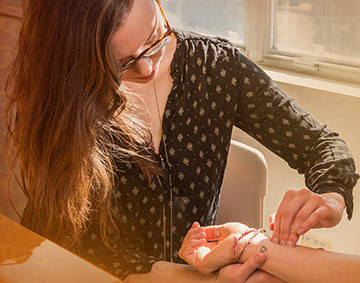
Learning Maharishi AyurVeda pulse diagnosis at Maharishi International University
“Here at Maharishi International University, where I teach doctors, graduate students, and undergraduate students, we have a rich body of resources on Maharishi AyurVeda and Integrative Medicine, as well as many online and on-campus courses that explore this approach. I invite everyone to take advantage of these programs, which are so important for self-care, for the treatment of disease, and for structuring a new approach to health care for the future,” he added. (See links below.)
“We’re all speaking the same language,” Dr. Steinbaum said. “And I believe this is the future of medicine. Whether you’re a patient, physician, or practitioner, we need to come together and talk about ultimate connections in order to change the face of medicine. We need to teach our own bodies how to heal. And we need to focus on our consciousness and our own sense of Self to ensure maximum health from the inside out.”
Introduction to Maharishi AyurVeda (free course) ►
B.A. in Ayurveda Wellness and Integrative Health ►
M.S. in Maharishi AyurVeda and Integrative Medicine ►
These MIU degree programs are the only accredited B.A. and M.S. programs in Ayurveda in the U.S.
“I invite everyone to take advantage of these programs, which are so important for self-care, for the treatment of disease, and for structuring a new approach to medicine for the future.” —Dr. Robert Schneider, Dean, MIU College of Integrative Medicine
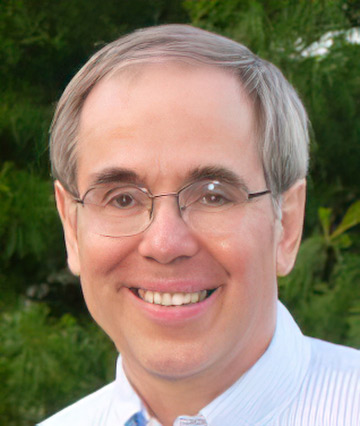
Gerry Geer is an Assistant Professor of Literature and Writing at Maharishi International University and works closely with the President and other faculty on a variety of writing and editing projects. He is director of publications at the University’s Institute of Science, Technology, and Public Policy; serves as international liaison for the Global Union of Scientists for Peace; and has taught the Higher States of Consciousness course to over 1,600 students. He received his B.A. magna cum laude in English from Harvard College, did graduate work in the Master of Theological Studies program at Harvard Divinity School, and received a Doctorate in World Peace (D.W.P.) from Maharishi European Research University in 2005.
Notes

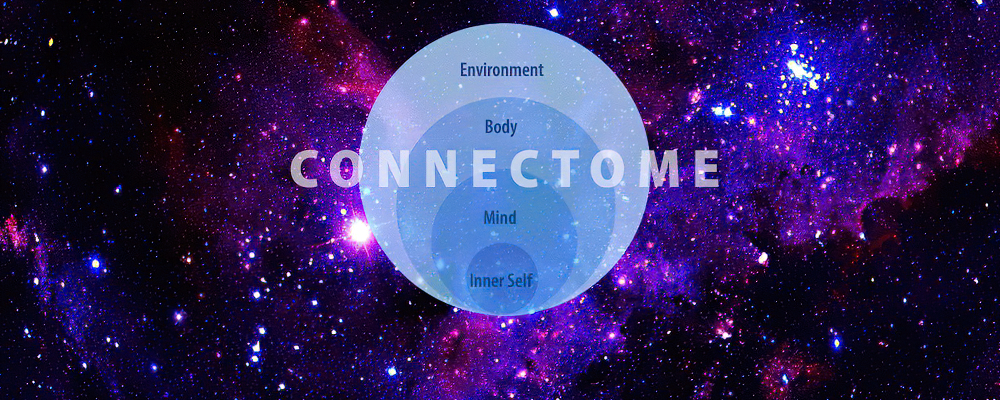
Comments
you may also like
Better Health
Maharishi AyurVeda—Discovering the Cure Within
Enjoy Dr. Tony Nader's Facebook talk on gaining healthy balance with Maharishi AyurVeda®, a revival of the oldest system of natural healthcare. Watch the replay of the recent webcast any time. Public viewing is available for all.
Better Health
Mind over Aging: 10 Steps to Living a Longer, Healthier, Happier Life | 18:33
Renowned cardiologist and expert in integrative medicine Dr. Robert Schneider distills 10 ancient rejuvenation practices, confirmed by modern science, to help us live longer, healthier, more self-actualized lives.
Better Health
What’s Your Mind-Body Type?
Take a quick quiz to find out. Then get easy dietary and lifestyle tips from Ayurvedic expert Dr. Nancy Lonsdorf.
Vedic Knowledge
Maharishi AyurVeda at MIU | 1:30:24
Sankari Wegman, Keith Wallace, Ph.D., Robert Schneider, M.D., and Maharishi International University faculty explain how the natural health system of Ayurveda is unique, give tips to boost immunity during the pandemic, and discuss MIU training programs in Maharishi AyurVeda.